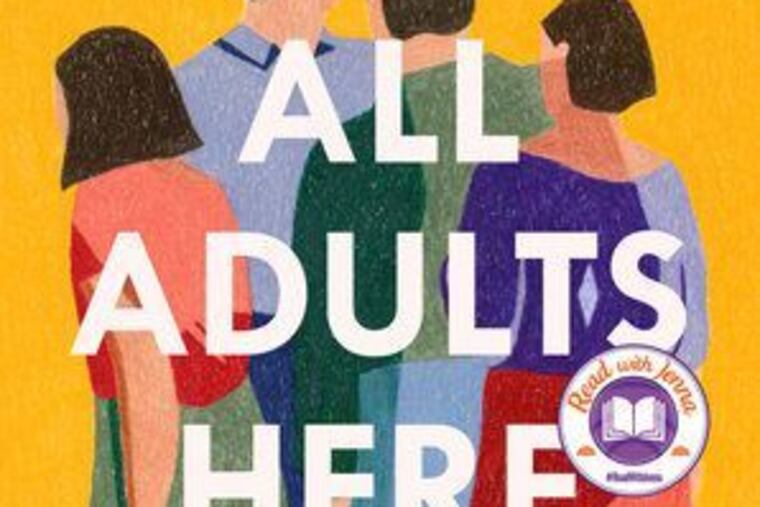Emma Straub’s ‘All Adults Here’ puts fresh, funny spin on family saga | Book review
It's an ideal read for anyone trapped at home with their family while self-isolating.

All Adults Here
By Emma Straub
Riverhead. 368 pp. $27
Reviewed by Angela Haupt
We’re all adults here, so let’s be frank: Families can be totally bonkers. Astrid Strick’s certainly is.
On a late-summer morning in the Hudson Valley, Astrid, a 68-year-old widow, witnesses her old nemesis Barbara Baker get hit and killed by a speeding school bus. Astrid was never one for self-reflection, but the accident shakes loose a legion of demons she can no longer dodge. There are "always more school buses," she realizes. There's "no time to waste, not in this life."
In Emma Straub’s delightful fourth novel, All Adults Here, Astrid grapples — for the first time — with what kind of parent she was, and what that means for her three kids, and their kids, decades later. Narration alternates among all the Stricks and is set in quaint Clapham, N.Y. The family homestead is called the Big House — but what happens inside is so entertaining, the Stricks might as well be gathered under the Big Top.
Meet the family: Astrid, the matriarch, knows how to get stains out of white shirts and has the proper clothing for any weather. She's capable and cold — though finally thawing. "She wished she could have a printout of all the mistakes she'd made as a parent, the big ones and the small ones, just to see how many of them she could guess (her temper was always shortest at bathtime) and how many she couldn't," Straub writes. How many of her secrets led to her kids' secrets, and what pain could she have prevented along the way?
As she comes to terms with her family, Astrid is also coming to terms with her sexuality: She's involved in a romantic relationship with her female hairdresser. This, naturally, will be revealed at a raucous family dinner. Her children's reaction aside, it's a lovely subplot. Romance can soften even the hardest of mothers.
Elliot, the eldest of Astrid's offspring, can't make decisions and is generally dissatisfied with his life and career. "The cruelest part of becoming middle-aged," he muses, is that it comes "on the heels of one's own youth, not some other, better youth, and that it was too late to start over." He pins much of his discontentment on his mother's missteps. Wait until she gets wind of the fact that he bought the empty eyesore of a building in the center of town — the one whose future Astrid has loudly campaigned about.
Porter, the middle child, smells like goats and cheese. She runs a dairy farm and, unbeknownst to her family, is pregnant via a sperm bank, which she likens to a "stud farm." She spends her free time conducting an affair with her married high school boyfriend.
Astrid's carefree youngest, Nicky, left home before he was 18 and rarely returns. He likes yurts and weed and once appeared as a handsome high school student in a movie, for which he's still recognized. He's sent his 13-year-old daughter, Cecelia, to stay with Astrid following an incident at her school in Brooklyn, and she's the most adult of them all.
Straub deftly weaves the various characters’ stories into a slice-of-life plot that builds slowly. The book is wide-ranging, squeezing in commentary on abortion, gender identity, bullying, sexual predators, and more. It’s hip and of-the-moment, down to the lingo: “Gammy, I think you’re a Barbara stan,” Cecelia whispers to Astrid, referencing a popular term for “stalker” or “fan.” (Astrid remains preoccupied with her mowed-down acquaintance throughout the novel.) “What is that, a country?” she asks Cecelia. “Afghanistan?”
The novel is ripe with the kind of juicy gossip perfect for swapping with a favorite sibling via late-night, hushed phone calls. The Strick family is appealing in part because its members are recognizable: Astrid makes a convincing detached mother, and the other family members are familiar in their idiosyncrasies and grudges. Their problems could be — and probably have been — our problems.
As in her previous novels, including 2015′s The Vacationers and 2016′s Modern Lovers, Straub’s characters are flawed but likable. And they’re doing their best. As the Stricks bump down the road to self-discovery — a journey punctuated by small victories — there’s an undercurrent of hope. When you have regrets, you can apologize. And second and third chances exist, even (or especially) when your family is a hot mess.
All Adults Here is deliciously funny and infectiously warm — a clever blend of levity and poignant insights. Straub’s flair for irony and wit shine, and she puts a fresh (and progressive) spin on the age-old multigenerational family saga.
It's an ideal read for anyone trapped at home with their family while self-isolating. Read it while hiding in your bedroom from the people who are driving you crazy, but who you'd go crazy without.
Ah, family dysfunction. Isn't it fun?
From the Washington Post.